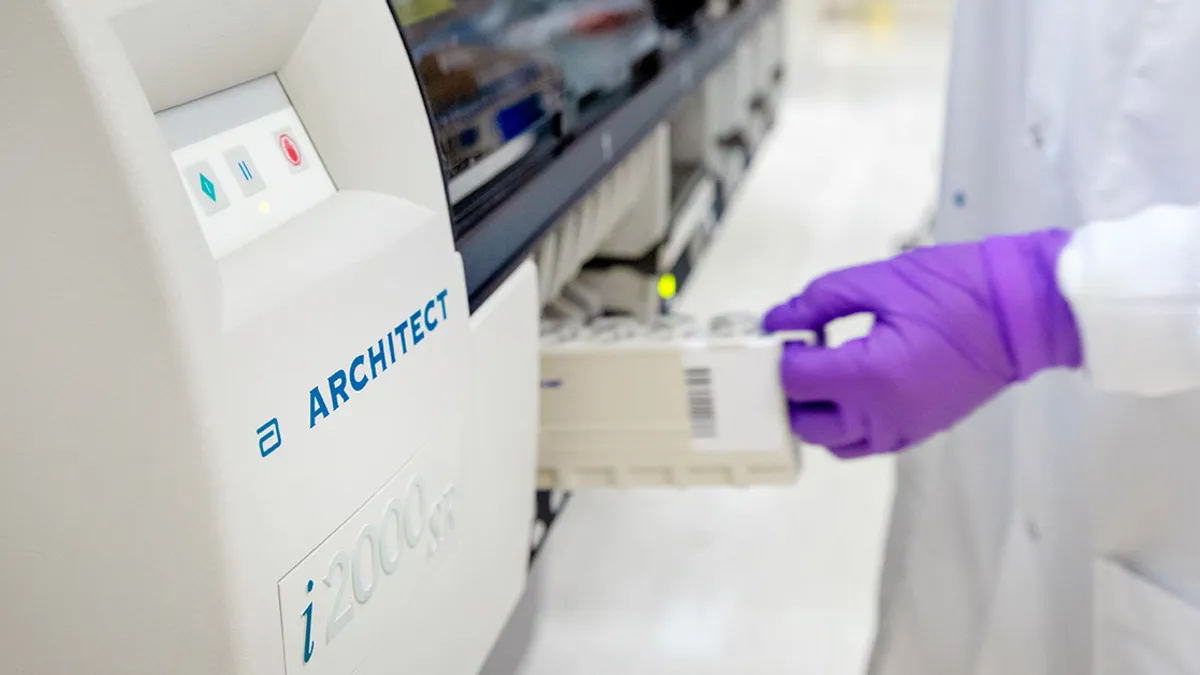Dive Brief:
- Abbott on Thursday reported $7.3 billion in second quarter revenue, a 5.4% decrease on an organic basis. Still, results exceeded Wall Street analyst expectations, fueled in part by coronavirus testing sales of $615 million.
- The medtech giant's molecular diagnostics sales jumped 233.6% driven by demand for the company's rapid, point-of-care ID NOW platform. At the same time, medical device sales dropped about 20%, hit by reduced cardiovascular and neuromodulation procedure volumes due to the pandemic.
- Nonetheless, CEO Robert Ford told investors on Thursday's call that Abbott experienced significant improvements in growth trends in some business areas despite the ongoing public health crisis. "As we progressed through the quarter, we saw steady improvements in both testing and procedure volumes across our hospital-based businesses," Ford said.
Dive Insight:
Abbott pulled its guidance for the year when the company reported first quarter sales in April, citing uncertainties regarding the duration and impact of the coronavirus pandemic. However, Ford was more upbeat about the rest of 2020 and said the medtech now forecasts adjusted earnings per share of at least $3.25 for the full year.
Over the course of the second quarter, Ford said Abbott saw steady improvements in procedure volumes across the medtech's cardiovascular and neuromodulation portfolio. He noted that by the end of June these procedure volumes had "rebounded" to about 90% of pre-pandemic levels on average in the U.S.
Abbott's diagnostics sales grew 7% in the second quarter on an organic basis.
"Similar to what we saw in medical device procedures, testing volumes in our underlying diagnostics business, which excludes COVID-19 tests, rebounded to approximately 90% of pre-COVID levels by the end of the second quarter," Ford said.
When it comes to COVID-19 tests, molecular diagnostics were up 241% and rapid diagnostics increased 11%, respectively. Strong demand for Abbott's lab-based tests for the coronavirus resulted in diagnostics sales of $283 million in the quarter, while Abbott's point-of-care COVID-19 molecular test on its ID NOW platform helped drive rapid diagnostics sales of $180 million in the quarter.
"We think COVID testing will stick around," commented Ford.
Abbott's consumer-facing businesses, such as diabetes care, nutrition, and established pharmaceuticals, have continued to be "resilient" amid the pandemic collectively growing 9% in the first half of the year, according to Ford.
In the area of diabetes care, FreeStyle Libre sales in the second quarter increased 40% on an organic basis. Last month, Abbott announced long-awaited FDA approval of FreeStyle Libre 2 as an integrated continuous glucose monitoring (iCGM) system for adults and children ages 4 and older with diabetes.
Ford added that Abbott will be launching the device in the next few weeks at the same price as the currently available FreeStyle Libre 14-day system.
Ford also touted recent CE mark approval of TriClip, which the company contends is the world's first minimally invasive device for repairing a leaky tricuspid heart valve calling it "a new market opportunity for our structural heart business," with "potential to be a significant area of growth over the next several years."
Abbott's financial health remains strong. The company ended the second quarter with about $5 billion in cash and short-term investments, an increase of more than $1 billion compared to the end of the first quarter.













